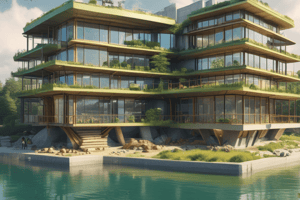Podcast
Questions and Answers
What is a primary challenge that developing countries face regarding the feasibility of green building construction?
What is a primary challenge that developing countries face regarding the feasibility of green building construction?
- Surplus of green building materials.
- Excessive government regulation.
- High public awareness of green building benefits.
- Higher initial costs and lack of expertise. (correct)
Why is life-cycle cost analysis crucial when evaluating the economic feasibility of green buildings?
Why is life-cycle cost analysis crucial when evaluating the economic feasibility of green buildings?
- It focuses solely on increasing rental rates.
- It ignores environmental and social benefits.
- It only considers the initial construction costs.
- It accounts for long-term savings from reduced operating costs. (correct)
How do green building practices contribute to climate change mitigation?
How do green building practices contribute to climate change mitigation?
- By promoting deforestation for material sourcing.
- By increasing reliance on non-renewable energy sources.
- By reducing greenhouse gas emissions. (correct)
- By increasing greenhouse gas emissions.
How can green building projects positively impact local economies?
How can green building projects positively impact local economies?
What role do smart building technologies play in enhancing the feasibility of green buildings?
What role do smart building technologies play in enhancing the feasibility of green buildings?
How do public procurement policies contribute to the adoption of green building practices?
How do public procurement policies contribute to the adoption of green building practices?
What is a significant drawback of green building construction?
What is a significant drawback of green building construction?
What design considerations are particularly important in hot and humid climates for green building?
What design considerations are particularly important in hot and humid climates for green building?
What is the role of life-cycle cost analysis in overcoming barriers to green building adoption?
What is the role of life-cycle cost analysis in overcoming barriers to green building adoption?
Which of the following is a global trend observed in green building practices?
Which of the following is a global trend observed in green building practices?
What is a key consideration for promoting social equity in green building initiatives?
What is a key consideration for promoting social equity in green building initiatives?
Why is accurately measuring and verifying environmental performance a challenge in green building?
Why is accurately measuring and verifying environmental performance a challenge in green building?
How do sustainable materials contribute to environmental feasibility in green building??
How do sustainable materials contribute to environmental feasibility in green building??
In arid climates, what is a critical aspect of green building design?
In arid climates, what is a critical aspect of green building design?
What role do green roofing technologies play in sustainable building practices?
What role do green roofing technologies play in sustainable building practices?
Flashcards
Green Building Construction
Green Building Construction
Designing, building, and operating buildings in a way that minimizes environmental impact and resource use throughout the building's life.
Life-Cycle Cost Analysis
Life-Cycle Cost Analysis
A method to assess all costs over a building's entire lifespan, including initial and operational costs.
Life Cycle Assessment (LCA)
Life Cycle Assessment (LCA)
Evaluating the environmental effects of materials and construction from raw material extraction to disposal.
Green Building Certifications
Green Building Certifications
Signup and view all the flashcards
Net-Zero Energy Buildings
Net-Zero Energy Buildings
Signup and view all the flashcards
Smart Building Technologies
Smart Building Technologies
Signup and view all the flashcards
Government Incentives
Government Incentives
Signup and view all the flashcards
Greenwashing
Greenwashing
Signup and view all the flashcards
Water Management
Water Management
Signup and view all the flashcards
Sustainable Materials
Sustainable Materials
Signup and view all the flashcards
Passive Cooling
Passive Cooling
Signup and view all the flashcards
Site Selection Impact
Site Selection Impact
Signup and view all the flashcards
Occupant Comfort and Health
Occupant Comfort and Health
Signup and view all the flashcards
Streamlining Permitting
Streamlining Permitting
Signup and view all the flashcards
Building Resilience
Building Resilience
Signup and view all the flashcards
Study Notes
- Green building construction refers to designing, building, and operating buildings in a sustainable manner
- It aims to minimize environmental impact and resource consumption throughout a building's lifecycle
Feasibility of Green Building Construction Across the Globe
- Green building feasibility varies significantly across different regions
- Developed countries often have stricter building codes and greater awareness, making green building more feasible
- Developing countries may face challenges such as higher initial costs, lack of expertise, and weak regulatory frameworks
- Government incentives, subsidies, and tax breaks can greatly improve feasibility
- Availability of green building materials is a key factor; local sourcing reduces transportation costs and environmental impact
- Climate conditions influence design choices and the potential for energy efficiency
Economic Feasibility
- Initial costs can be higher than conventional construction due to specialized materials and technologies
- Life-cycle cost analysis is crucial; green buildings often have lower operating costs due to energy and water efficiency
- Reduced energy consumption leads to lower utility bills, providing long-term savings
- Green buildings may command higher rental rates or sale prices, increasing return on investment
- Government incentives and financial assistance programs reduce upfront investment
- Cost-benefit analysis should consider environmental and social benefits, not just financial returns
Environmental Feasibility
- Green building practices reduce greenhouse gas emissions and contribute to climate change mitigation
- Efficient water management lowers water consumption and conserves water resources
- Sustainable materials minimize waste and reduce environmental impact through their lifecycles
- Improved indoor air quality enhances occupant health and productivity
- Site selection and development practices can minimize disruption to local ecosystems and biodiversity
- Life cycle assessments (LCA) evaluate the environmental impacts of building materials and construction processes
Social Feasibility
- Green buildings enhance occupant comfort and health through better air quality and natural lighting
- Green building projects can create green jobs and stimulate local economies
- Community engagement and education raise awareness of sustainability issues
- Green building certifications (e.g., LEED, BREEAM) provide a framework for assessing and promoting sustainability
- Universal accessibility and inclusive design are important aspects of social feasibility
- Addressing social equity through affordable green housing initiatives is crucial
Technological Feasibility
- Availability of renewable energy technologies (solar, wind) enhances energy independence
- Smart building technologies optimize energy use and improve building performance
- Advanced insulation materials and techniques reduce heat loss and gain
- Water-efficient fixtures and rainwater harvesting systems conserve water
- Green roofing technologies reduce stormwater runoff and provide insulation
- Innovative construction methods minimize waste and improve efficiency
Regulatory and Policy Environment
- Building codes and regulations play a crucial role in promoting green building practices
- Government incentives, tax credits, and subsidies encourage adoption of green technologies
- Green building certification programs provide a voluntary framework for achieving sustainability goals
- Public procurement policies can drive demand for green building products and services
- International agreements and collaborations promote knowledge sharing and technology transfer
- Streamlining permitting processes reduces delays and costs for green building projects
Difficulties and Drawbacks
- Higher upfront costs can be a significant barrier
- Lack of awareness and expertise among builders and developers
- Limited availability of green building materials in certain regions
- Longer payback periods for some green technologies
- Complexity of green building design and construction
- Resistance to change from traditional construction practices
- Difficulty in accurately measuring and verifying environmental performance
- Potential for "greenwashing," where buildings are marketed as green without meeting rigorous standards
Specific Challenges in Diverse Climates
- Hot and humid climates require designs that prioritize passive cooling and ventilation
- Cold climates need high-performance insulation and heating systems
- Arid climates necessitate water conservation and drought-resistant landscaping
- Seismic zones demand earthquake-resistant green building designs
- Coastal regions must address issues such as sea-level rise and storm surge
- Tropical regions require designs that are resistant to pests and humidity
Overcoming Barriers to Adoption
- Providing education and training to builders, developers, and policymakers
- Offering financial incentives and technical assistance
- Streamlining permitting processes and reducing regulatory burdens
- Promoting the use of life-cycle cost analysis
- Raising awareness among consumers and the public
- Encouraging collaboration among stakeholders
- Investing in research and development of new green building technologies
- Implementing robust certification and labeling programs
Global Trends in Green Building
- Increasing adoption of green building practices in both developed and developing countries
- Growing demand for green building certifications
- Rise of net-zero energy and water buildings
- Focus on building resilience to climate change impacts
- Integration of smart building technologies
- Emphasis on health and well-being in building design
- Circular economy principles applied to building materials and waste management
- Increasing use of mass timber and other sustainable materials
Studying That Suits You
Use AI to generate personalized quizzes and flashcards to suit your learning preferences.





